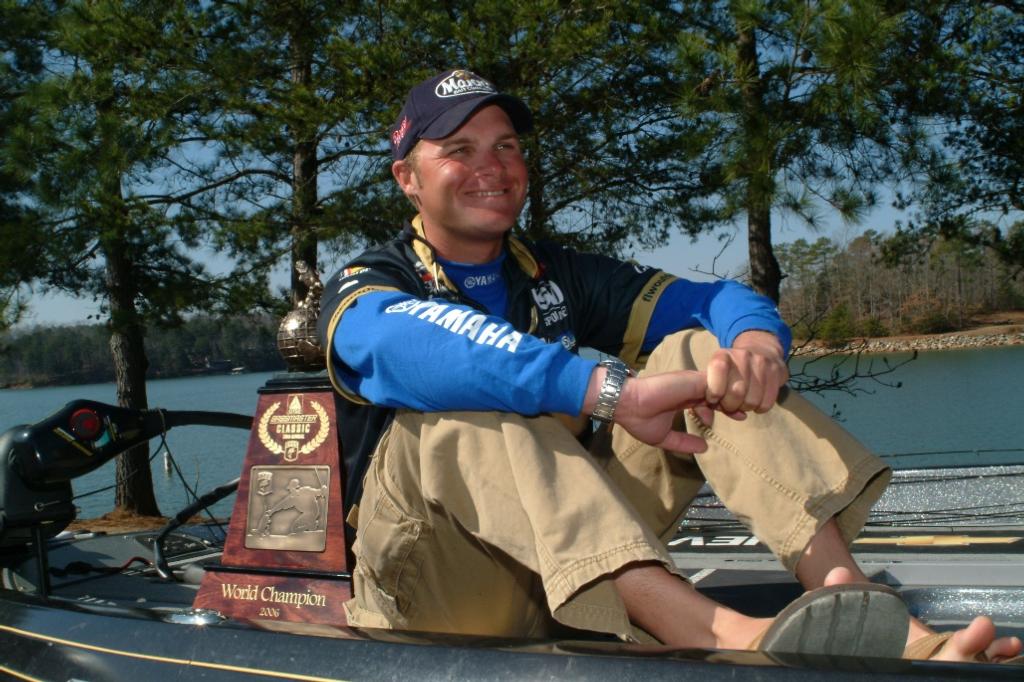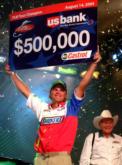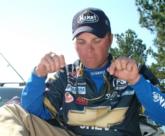Laid-back Luke
Recent Bassmaster Classic champion brings no-frills feel back to professional fishing

Luke Clausen of Spokane, Wash., has every reason to be a showboat. He’s 27 years old, he’s now a millionaire, he’s from the West Coast, and he’s a high-profile professional bass angler, which, of late, occasionally gets misconstrued as license to impersonate a pop star.
But with Clausen there are no wild hairdos, no dance routines, no screaming and no cussing fits of rage. He’s the same Luke Clausen whether he’s on the water or off, whether he’s on camera or off.
In a span of just 16 months, Clausen has won the Wal-Mart FLW Tour Championship and the Bassmaster Classic, collecting $500,000 from each and making him the youngest pro ever to win a million dollars in bass fishing.
And as of yet, there have been no sudden pretenses, no immediate agendas and no developing thirst for extra attention.
“I’ve known Luke for several years,” said good friend and fellow competitor Andy Morgan of Dayton, Tenn. “He’s the same Luke Clausen now as he was three years ago when he was sleeping in his truck and eating PB&Js. He didn’t come out here to get rich or show off. He’s just a regular, laid-back guy that loves to fish.”
Learning Luke
Just days after his Classic victory, Clausen shuffles into a photo session wearing a T-shirt , cargo pants and flip-flops, carrying a selection of crisp tournament jerseys and caps for the shoot.
, cargo pants and flip-flops, carrying a selection of crisp tournament jerseys and caps for the shoot.
Clausen politely obliges all photographers’ requests without a single gripe. But watching the newly crowned fishing champ under the flash of cameras, one gets the feeling that all Clausen really seeks in life is his own tiny piece of paradise, where he can stay out of everyone’s way.
Clausen actually found that very place many years ago, as a kindergartener, while peering over the side of his dad’s aluminum boats into the clear waters of Newman Lake near Spokane, Wash., watching little green fish scoot around on the bottom and wondering how to trick them into eating.
“Those are my earliest memories of fishing,” Clausen recalled. “Fishing with my dad before and after school on Newman Lake. Even as a little kid, I was totally consumed with making fish bite something.”
What was just a hobby for the elder Clausen turned into a feverish obsession for young Luke.
“As a teenager I spent every spare moment at the lake fishing,” he said. “During my 15th summer, my mom would drop me and the aluminum boat off at the lake every day on her way to work and then pick me up on the way home. I spent days on end in that boat learning everything I could about bass.”
At the age of 17, Clausen and a friend qualified for the year-end championship of a regional team circuit and won it, taking home a fully rigged bass boat. From that point on, competitive fishing consumed Clausen.
“That really lit my fire,” he said. “The day we won that boat, that was a defining moment in terms of what I wanted to do with my life. The money from selling that boat was huge for a kid my age.”
Clausen figured if he could win just one boat a year, he could make just as much money as his high school buddies who had regular part-time jobs – and that’s exactly what he did. Over the next five years, he won four boats.
“I worked part time here and there,” he said. “I trained dogs one summer, worked at PetSmart another summer, worked at a tackle store another summer. But the bulk of my income in high school and through college was from winning bass boats in tournaments.”
Between tournaments, Clausen did manage to study enough at Eastern Washington University to receive a degree in marketing and management.
Upon graduation, however, Clausen’s idea of employment differed considerably from his parents’ idea of employment.
“I think they were thinking: get a job, get married, settle down and have kids,” Clausen revealed. “Instead, I moved to Woodland, California, and fished tournaments, which caused a bit of controversy with my parents – I don’t think they were too happy with my decision at the time.”
“It’s not like I was trying to be some kind of rebel, though,” Clausen added. “I just had other ideas about how I wanted to live my life. Being tied down to a 9-to-5 with a huge mortgage is not my style.”
Woodland, Calif., happened to be located among Clear Lake, the California Delta and Lake Oroville, three of California’s powerhouse tournament lakes, and Clausen continued to support himself on boat winnings.
Fresh out of college in 2002, Clausen fished a complete season of the BASS Western Opens, finishing third at the California Delta and qualifying for the 2002 Bassmaster Classic on Lay Lake.
He took on the Bassmaster Tour in 2003, which happened to be the year BASS incorporated the “Western Swing” in the BASS Tour with stops at none other than Clear Lake and the California Delta.
Young Clausen mopped up in tournament winnings in 2003, claiming nearly $70,000 from his BASS Tour finishes and a Stren Series win on Clear Lake.
Obviously, Clausen has a pile of fishing talent, but he’s also quick to point out that he is a product of the tremendous growth in tournament bass fishing over the last five years.
“I’ve made a living off tournament winnings since I started fishing professionally,” Clausen pointed out. “I don’t think I could have done that 10 or 15 years ago. Thanks in large part to this new standard of 50th place paying $10,000 in professional tournaments, this is the first time in this sport’s history where talented fishermen can exceed their expenses with the payouts. It’s just a great time to be in this sport.”
Level-headed Luke
Clausen’s fishing abilities have taken him far ahead of the $10,000 check line. With his two world-championship titles, he joins an elite group of pros who have won the FLW Tour Championship and the Bassmaster Classic, including George Cochran, Davy Hite, David Fritts and Dion Hibdon.
“To win the two biggest events in the sport in such a short timespan is pretty uncanny; I wish I could explain it,” he said. “If I could, maybe I could win a lot more tournaments.”
Perhaps it’s the emotional elements of the superhigh-pressure events that give Clausen the upper hand. He is immune to the emotional roller coaster that creates pits and butterflies in the stomachs of his competitors.
In the midst of chaos, catastrophe or celebration, Clausen’s laser-like focus stays dead level.
During both the Bassmaster Classic and the FLW Tour Championship, Clausen lost fish in the finals that could have proved very costly, yet he never uttered a cross word or showed remorse.
And on two occasions, when he has been put upon a pedestal amid showering graffiti and a roaring crowd to accept $500,000, Clausen’s response has been almost anticlimactic. It’s as if you can hear him thinking, “Thanks, do I need to exit stage right or left?”
“I’m a pretty even-keeled person,” Clausen revealed. “I don’t get supermad when I lose a fish, and I don’t go bananas when I catch a big one, either. The only thing that really gets to me is not being able to figure the fish out. When I don’t have a clue as to what’s going on, that’s when I get a little testy. As long as I know what the fish are doing, losing one or two during a tournament really doesn’t bother me.”
Clausen also noted that he basically led both championships wire to wire, which is more comfortable for him.
“I know some guys like to be in the second or third spot, shooting for the winner going into the last day of a tournament – not me,” he said. “I’d much rather be in the lead and defend that lead – I just don’t feel any pressure in those situations.”
 “Even in Birmingham (FLW Championship), where the weight cut to zero in the finals, just knowing I had the biggest bag two of the three previous days gave me tremendous confidence that I was on the winning deal. It put me in a mode where I could ride down the lake and see exactly what I was looking for, and it put me at ease.
“Even in Birmingham (FLW Championship), where the weight cut to zero in the finals, just knowing I had the biggest bag two of the three previous days gave me tremendous confidence that I was on the winning deal. It put me in a mode where I could ride down the lake and see exactly what I was looking for, and it put me at ease.
“The exact same thing happened at Toho. Once I weighed in the 29-6 on day one, I became really relaxed and at ease, and just went fishing. I don’t know if I’d have been in the same frame of mind in both events had I been thinking I had to make up ground to catch the leader.”
Frugal Luke
Coming into a million dollars in less than two years would bring a lot of bling to the scene for most 27-year-olds, but not Clausen. He has the reputation as the most frugal angler on tour, and that hasn’t changed a bit since his financial windfall.
“He’s absolutely the tightest guy I’ve ever met,” chuckled fellow pro Andre Moore, who has competed against Clausen on the West Coast for years. “He’ll completely switch motels just to save 10 bucks over the course of a week – and that’s only if he splurges to get a motel and is not sleeping in his truck.”
Friend Scott Suggs of Bryant, Ark., agreed by adding, “Luke has won a million dollars in two years, and I’ll bet you he still has $999,999 of it left – he’s smart with his money.”
Even Andy Morgan has advised him to loosen the purse strings a bit.
“Luke loves to hunt, and since he’s won the Classic, I’ve begged him to join me on some kind of all-inclusive hunting trip, and he just won’t come off the wallet,” Morgan said.
Clausen defends his meager ways.
“When you learn how to make prize-boat winnings stretch out over nine or 10 months, penny-pinching becomes an acquired art, and it’s hard to give up,” Clausen said. “But it’s also my nature. Right now in my life, I just don’t care to have supernice places to stay or big, fancy meals. I can stay at the campground for a week and never go to a restaurant – never even see another person – and I’d be fine with it.”
Given his flat demeanor, Clausen wants it clear that he is not making himself out to be an impersonal loner who has no time for interaction.
“It’s not like that at all,” he pointed out. “Second only to catching bass, my favorite part of this job is traveling around seeing new places, meeting new people and especially trading hunting and fishing stories with others – it’s awesome. It’s one reason I don’t want to settle down anywhere. I haven’t found a part of the country that suits me as much as traveling around.”
Yet, we are at a time in professional bass fishing when pros are encouraged to “develop personalities” in an effort to attract corporate sponsors A few have taken the concept to another level, essentially contriving props and assembling expedient alter egos to make bass fishing appear more hip or cool.
It’s something Clausen wants no part of, even at the risk of being labeled insipid. Overall, he makes one thing clear: He is fishing for bass, not an image.
“This is tournament fishing, not American Idol,” Clausen offered. “If I don’t get sponsors because I don’t have a so-called `personality’ that requires me to act out and be a showboat, then so be it. I’ll keep fishing either way.”
 But Clausen has a sneaking suspicion that due to the events surrounding this year’s Bassmaster Classic – namely his victory juxtaposed to Mike Iaconelli’s on-camera mother of all meltdowns – the pendulum might start swinging back the other way.
But Clausen has a sneaking suspicion that due to the events surrounding this year’s Bassmaster Classic – namely his victory juxtaposed to Mike Iaconelli’s on-camera mother of all meltdowns – the pendulum might start swinging back the other way.
“I totally respect what Mike has done with a rod and reel, but I think what he did at the Classic this year is actually going to help guys like me get sponsors,” Clausen surmised. “In the corporate world, it’s very hard to undo a stunt gone bad like that, and in turn, companies are going to take a much harder look at the `personalities’ representing their products.
“Fishing is primarily a conservative sport, and to a large degree, that’s the very thing that appeals to many of the nonendemic companies that decide to test our sport’s waters from a sponsorship standpoint. And they simply can’t afford even the remote risk of a PR disaster on a public waterway. So I think this emphasis on `personality,’ with all of its flash and flair, will take a backseat for a while.
“And who knows,” Clausen added, finally smiling and revealing the kind of big, boyish grin usually reserved for freshly caught 10-pounders. “They might even decide to sponsor just a regular, everyday, average-Joe guy like me.”